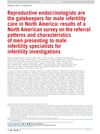 26 citations
,
July 2019 in “Fertility and Sterility”
26 citations
,
July 2019 in “Fertility and Sterility” Reproductive gynecologists are the main referrers for male infertility evaluations in North America.
 7 citations
,
January 2019 in “The Aging Male”
7 citations
,
January 2019 in “The Aging Male” Post-finasteride syndrome's existence is uncertain; more research needed.
 17 citations
,
December 2018 in “The World Journal of Men s Health”
17 citations
,
December 2018 in “The World Journal of Men s Health” Long-term use of dutasteride can cause permanent erectile dysfunction in rats.
 54 citations
,
May 2018 in “International journal of risk & safety in medicine”
54 citations
,
May 2018 in “International journal of risk & safety in medicine” Antidepressants, 5α-reductase inhibitors, and isotretinoin can cause long-lasting sexual dysfunction.
 40 citations
,
April 2018 in “Endocrine”
40 citations
,
April 2018 in “Endocrine” PFS and PSSD are similar conditions with persistent sexual dysfunction after stopping medication.
 11 citations
,
April 2018 in “Journal of Dermatology”
11 citations
,
April 2018 in “Journal of Dermatology” Dutasteride safely treats hair loss without harming sexual function.
11 citations
,
January 2018 in “International Journal of Trichology” The true incidence of post-Finasteride syndrome is unclear, and more research is needed.
 58 citations
,
April 2017 in “The Journal of Steroid Biochemistry and Molecular Biology”
58 citations
,
April 2017 in “The Journal of Steroid Biochemistry and Molecular Biology” Post-finasteride patients show changed neuroactive steroid levels, possibly causing erectile dysfunction and depression.
 50 citations
,
March 2017 in “PeerJ”
50 citations
,
March 2017 in “PeerJ” Using finasteride or dutasteride may cause long-lasting erectile dysfunction.
 50 citations
,
September 2016 in “The Journal of Clinical Endocrinology and Metabolism”
50 citations
,
September 2016 in “The Journal of Clinical Endocrinology and Metabolism” Finasteride for hair loss may cause persistent sexual symptoms, depression, anxiety, and lower quality of life.
 57 citations
,
July 2016 in “The Journal of Sexual Medicine”
57 citations
,
July 2016 in “The Journal of Sexual Medicine” 5α-reductase inhibitors increase the risk of sexual dysfunction, especially in men with enlarged prostate.
 31 citations
,
February 2016 in “American Journal of Men's Health”
31 citations
,
February 2016 in “American Journal of Men's Health” Finasteride can cause serious emotional side effects; doctors should check patients' mental health history before prescribing.
 43 citations
,
January 2016 in “International Journal of Andrology”
43 citations
,
January 2016 in “International Journal of Andrology” Finasteride caused long-term sexual and non-sexual side effects in young men with hair loss.
 33 citations
,
January 2016 in “Skin appendage disorders”
33 citations
,
January 2016 in “Skin appendage disorders” The document concludes that sexual and psychiatric side effects from 5-alpha-reductase inhibitors are reported, but more high-quality research is needed to understand how often they occur.
 33 citations
,
December 2015 in “Neuroendocrinology”
33 citations
,
December 2015 in “Neuroendocrinology” Finasteride treatment changes brain steroid levels and receptors, affecting brain function even after stopping treatment.
111 citations
,
August 2015 in “Reviews in Endocrine and Metabolic Disorders” 5α-reductase inhibitors may cause persistent sexual dysfunction and depression, needing more research on long-term effects.
 69 citations
,
July 2015 in “Pharmacotherapy”
69 citations
,
July 2015 in “Pharmacotherapy” Low-dose finasteride may cause lasting sexual dysfunction and suicidal thoughts in young men.
93 citations
,
September 2014 in “Diabetes” Lack of 5α-Reductase type 1 can lead to insulin resistance and liver problems.
 22 citations
,
August 2014 in “Clinical endocrinology”
22 citations
,
August 2014 in “Clinical endocrinology” Taking finasteride for benign prostate hyperplasia may increase the risk of osteoporosis, especially at higher doses.
 36 citations
,
June 2014 in “PLOS ONE”
36 citations
,
June 2014 in “PLOS ONE” Finasteride, a hair loss drug, may cause long-term sexual side effects due to changes in hormone receptor levels.
 81 citations
,
June 2014 in “American Journal of Men's Health”
81 citations
,
June 2014 in “American Journal of Men's Health” Finasteride can cause lasting sexual, emotional, and cognitive issues, with varying severity.
 54 citations
,
September 2013 in “Fertility and Sterility”
54 citations
,
September 2013 in “Fertility and Sterility” Finasteride can reduce fertility in some men, but stopping it increases sperm count.
 112 citations
,
July 2012 in “The Journal of Sexual Medicine”
112 citations
,
July 2012 in “The Journal of Sexual Medicine” Finasteride may cause long-lasting sexual side effects.
 185 citations
,
March 2011 in “The Journal of Sexual Medicine”
185 citations
,
March 2011 in “The Journal of Sexual Medicine” Finasteride for hair loss can cause long-lasting sexual side effects like low libido and erectile dysfunction.
 36 citations
,
February 2011 in “Fertility and Sterility”
36 citations
,
February 2011 in “Fertility and Sterility” Finasteride use may cause sperm damage and infertility, stopping it can improve sperm health.
 38 citations
,
December 2010 in “Fertility and Sterility”
38 citations
,
December 2010 in “Fertility and Sterility” Finasteride may cause male infertility, stopping it can help.
 24 citations
,
January 2010 in “Endocrine Regulations”
24 citations
,
January 2010 in “Endocrine Regulations” Taking 1mg of finasteride daily can mildly improve metabolic health and glucose regulation in men with male pattern baldness.
49 citations
,
December 2007 in “Fertility and Sterility” Stopping finasteride improved sperm counts in two men, reducing the need for fertility treatments.
 225 citations
,
July 2007 in “The Journal of Sexual Medicine”
225 citations
,
July 2007 in “The Journal of Sexual Medicine” Knowing about finasteride's sexual side effects increases reported dysfunction.
 195 citations
,
February 2007 in “The Journal of Clinical Endocrinology and Metabolism”
195 citations
,
February 2007 in “The Journal of Clinical Endocrinology and Metabolism” Dutasteride and finasteride may reduce sperm count and volume but don't affect movement or shape; effects are reversible after stopping.
 99 citations
,
October 2006 in “BMC clinical pharmacology”
99 citations
,
October 2006 in “BMC clinical pharmacology” Finasteride may cause slight depression and anxiety.
48 citations
,
February 2006 in “Molecular and Cellular Endocrinology” 5α-reductase inhibitors may reduce male fertility and could be used for male contraception.
 34 citations
,
January 2004 in “Revista do Hospital das Clínicas”
34 citations
,
January 2004 in “Revista do Hospital das Clínicas” Finasteride may worsen infertility in men with existing issues, but stopping it can improve sperm health.
 104 citations
,
October 1999 in “The Journal of Urology”
104 citations
,
October 1999 in “The Journal of Urology” Finasteride doesn't harm male fertility or sperm quality, but may slightly reduce ejaculate volume.
































